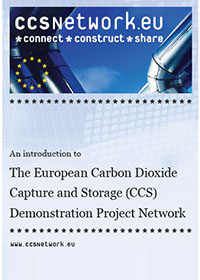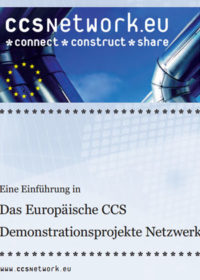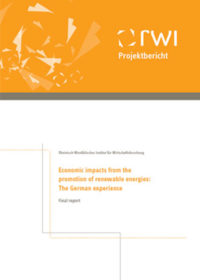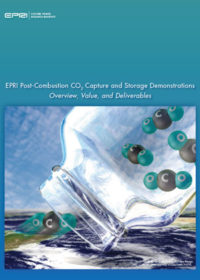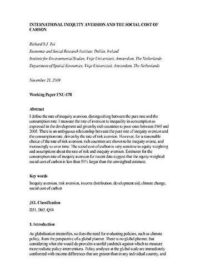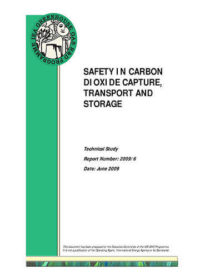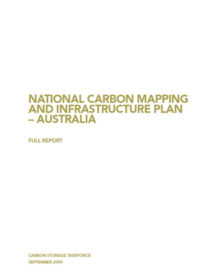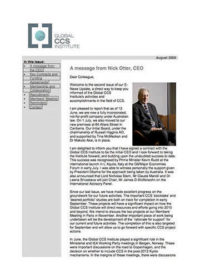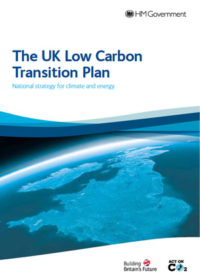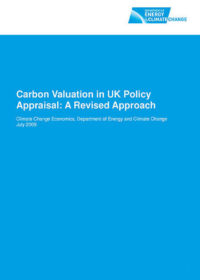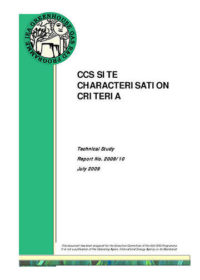Resources
Publications
Our publications, reports and research library hosts over 500 specialist reports and research papers on all topics associated with CCS.
View our Publication Library Disclaimer.
Filter by
An introduction to the European Carbon Dioxide Capture and Storage (CCS) Demonstration Project Network
13th October 2009
Topic(s): Carbon capture use and storage (CCUS)
Disclaimer
The content within the Global CCS Institute Publications, Reports and Research Library is provided for information purposes only. We make every effort and take reasonable care to keep the content of this section up-to-date and error-free. However, we make no claim as to its accuracy, currency or reliability.
Content and material featured within this section of our website includes reports and research published by third parties. The content and material may include opinions and recommendations of third parties that do not reflect those held by the Global CCS Institute.
Eine Einführung in Das Europäische CCS Demonstrationsprojekte Netzwerk
13th October 2009
Topic(s): Carbon capture use and storage (CCUS)
Disclaimer
The content within the Global CCS Institute Publications, Reports and Research Library is provided for information purposes only. We make every effort and take reasonable care to keep the content of this section up-to-date and error-free. However, we make no claim as to its accuracy, currency or reliability.
Content and material featured within this section of our website includes reports and research published by third parties. The content and material may include opinions and recommendations of third parties that do not reflect those held by the Global CCS Institute.
Economic impacts from the promotion of renewable energies: the German experience
1st October 2009
Topic(s): Domestic policy, Economics, Energy security, Renewables
This paper reviews Germany’s Renewable Energy Sources Act (EEG), focusing on its costs and the associated implications for job creation and climate protection. The authors argue that German renewable energy policy, and in particular the adopted feed-in tariff scheme, has failed to harness the market incentives needed to ensure a viable and cost-effective introduction of renewable energies into the country’s energy portfolio.
Disclaimer
The content within the Global CCS Institute Publications, Reports and Research Library is provided for information purposes only. We make every effort and take reasonable care to keep the content of this section up-to-date and error-free. However, we make no claim as to its accuracy, currency or reliability.
Content and material featured within this section of our website includes reports and research published by third parties. The content and material may include opinions and recommendations of third parties that do not reflect those held by the Global CCS Institute.
EPRI post-combustion CO2 capture and storage demonstrations: overview, value, and deliverables
1st October 2009
Topic(s): Carbon capture use and storage (CCUS), CO2 capture, CO2 storage
The Electric Power Research Institute, Inc. (EPRI) has examined options for reducing greenhouse gas (GHG) emissions from the electric sector. This publication details EPRI’s analysis, showing significant potential carbon dioxide (CO2) reduction from advanced coal power systems that include CO2 capture and storage (CCS) technology, making such systems likely to be an essential component of a full portfolio of GHG reductions strategies.
Disclaimer
The content within the Global CCS Institute Publications, Reports and Research Library is provided for information purposes only. We make every effort and take reasonable care to keep the content of this section up-to-date and error-free. However, we make no claim as to its accuracy, currency or reliability.
Content and material featured within this section of our website includes reports and research published by third parties. The content and material may include opinions and recommendations of third parties that do not reflect those held by the Global CCS Institute.
International inequity aversion and the social cost of carbon
21st September 2009
Topic(s): Economics, Policy law and regulation, Social cost
Disclaimer
The content within the Global CCS Institute Publications, Reports and Research Library is provided for information purposes only. We make every effort and take reasonable care to keep the content of this section up-to-date and error-free. However, we make no claim as to its accuracy, currency or reliability.
Content and material featured within this section of our website includes reports and research published by third parties. The content and material may include opinions and recommendations of third parties that do not reflect those held by the Global CCS Institute.
Safety in carbon dioxide capture, transport and storage
1st September 2009
Topic(s): Carbon capture use and storage (CCUS), Health safety and environment
This study was contracted to the UK Governments main Health and Safety Laboratory (HSL) which has become involved in a number of issues relating to safety in CCS projects.
The study has been specifically designed to examine the saftey issues which are likely to arise when preparing saftey cases and planning emergency procedures for CO2 capture and storage (CCS) projects.
The study found that the industry has sufficient experience in its totality, some of it very extensive, to conduct CCS operations safely, however, unless this information can consistently be made freely available and accessible where it is needed, the safety of CCS systems may be jeopardized.
Disclaimer
The content within the Global CCS Institute Publications, Reports and Research Library is provided for information purposes only. We make every effort and take reasonable care to keep the content of this section up-to-date and error-free. However, we make no claim as to its accuracy, currency or reliability.
Content and material featured within this section of our website includes reports and research published by third parties. The content and material may include opinions and recommendations of third parties that do not reflect those held by the Global CCS Institute.
National carbon mapping and infrastructure plan – Australia : full report
1st September 2009
Topic(s): Carbon capture use and storage (CCUS)
The Carbon Storage Taskforce developed this Plan under the National Low Emissions Coal Initiative. This Plan describes the risks and opportunities presented by transport and storage of carbon dioxide, acting as Australia’s roadmap to prioritising the development of suitable storage sites and the necessary pipeline infrastructure.
Deployment of carbon dioxide (CO2) transport and storage in Australia is technically viable and, under appropriate management regimes, safe. However, current geological and engineering activities must be accelerated and maintained over the next decade if the nation is to be in a position to capture the opportunity for commercial deployment beyond 2020.
Disclaimer
The content within the Global CCS Institute Publications, Reports and Research Library is provided for information purposes only. We make every effort and take reasonable care to keep the content of this section up-to-date and error-free. However, we make no claim as to its accuracy, currency or reliability.
Content and material featured within this section of our website includes reports and research published by third parties. The content and material may include opinions and recommendations of third parties that do not reflect those held by the Global CCS Institute.
The second E-News update from the Global CCS Institute with information on our activities and accomplishments in the field of CCS.
Disclaimer
The content within the Global CCS Institute Publications, Reports and Research Library is provided for information purposes only. We make every effort and take reasonable care to keep the content of this section up-to-date and error-free. However, we make no claim as to its accuracy, currency or reliability.
Content and material featured within this section of our website includes reports and research published by third parties. The content and material may include opinions and recommendations of third parties that do not reflect those held by the Global CCS Institute.
The landscape of carbon dioxide capture, storage, and management (CCSM) education in the UK
1st August 2009
Topic(s): Carbon capture use and storage (CCUS), Education, Public engagement
The scope of this report is to identify academic perspectives and programs in the areas of CCS and carbon management currently available in the United Kingdom (UK). The information assembled in this report was sought from the internet, email contacts and visiting key universities in CCSM in the UK. This report addresses the major findings and discusses the current landscape of CCSM education in the UK.
Disclaimer
The content within the Global CCS Institute Publications, Reports and Research Library is provided for information purposes only. We make every effort and take reasonable care to keep the content of this section up-to-date and error-free. However, we make no claim as to its accuracy, currency or reliability.
Content and material featured within this section of our website includes reports and research published by third parties. The content and material may include opinions and recommendations of third parties that do not reflect those held by the Global CCS Institute.
The UK low carbon transition plan: national strategy for climate and energy
15th July 2009
Topic(s): Carbon capture use and storage (CCUS), Economics, Nuclear energy, Policy law and regulation, Renewables
This White Paper sets out the United Kingdom's low carbon transition plan from 2009 to 2020. This plan aims to deliver emission cuts of 18% on 2008 levels by 2020 (and over a one third reduction on 1990 levels).
Disclaimer
The content within the Global CCS Institute Publications, Reports and Research Library is provided for information purposes only. We make every effort and take reasonable care to keep the content of this section up-to-date and error-free. However, we make no claim as to its accuracy, currency or reliability.
Content and material featured within this section of our website includes reports and research published by third parties. The content and material may include opinions and recommendations of third parties that do not reflect those held by the Global CCS Institute.
Carbon valuation in UK policy appraisal: a revised approach
1st July 2009
Topic(s): Carbon markets, Economics, Social cost
Disclaimer
The content within the Global CCS Institute Publications, Reports and Research Library is provided for information purposes only. We make every effort and take reasonable care to keep the content of this section up-to-date and error-free. However, we make no claim as to its accuracy, currency or reliability.
Content and material featured within this section of our website includes reports and research published by third parties. The content and material may include opinions and recommendations of third parties that do not reflect those held by the Global CCS Institute.
CCS site characterisation criteria
1st July 2009
Topic(s): Carbon capture use and storage (CCUS), CO2 storage
The IEA Greenhouse Gas R&D Programme (IEA GHG) has recently commissioned the Alberta Research Council in Canada to conduct a review of storage site selection criteria and site characterisation methods in order to produce a synthesis report. Among the various elements of the CO2 capture and storage (CCS) chain, the stage of storage site selection and characterisation is of critical importance because any storage site must demonstrate that it satisfies three fundamental requirements:
- capacity to store the intended volume of CO2 over the lifetime of the operation,
- injectivity, to accept/take CO2 at the rate that it is supplied from the emitter(s),
- containment, to ensure that CO2 will not migrate and/or leak out of the storage unit (safety and security of storage).
This report reviews the literature on the subject on site selection and characterisation since the publication of the IPCC Special Report on CCS, and provides a synthesis and classification of criteria.
Disclaimer
The content within the Global CCS Institute Publications, Reports and Research Library is provided for information purposes only. We make every effort and take reasonable care to keep the content of this section up-to-date and error-free. However, we make no claim as to its accuracy, currency or reliability.
Content and material featured within this section of our website includes reports and research published by third parties. The content and material may include opinions and recommendations of third parties that do not reflect those held by the Global CCS Institute.
